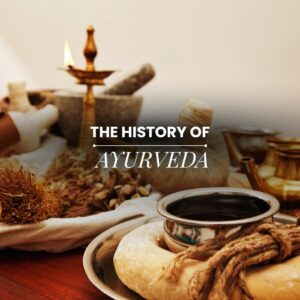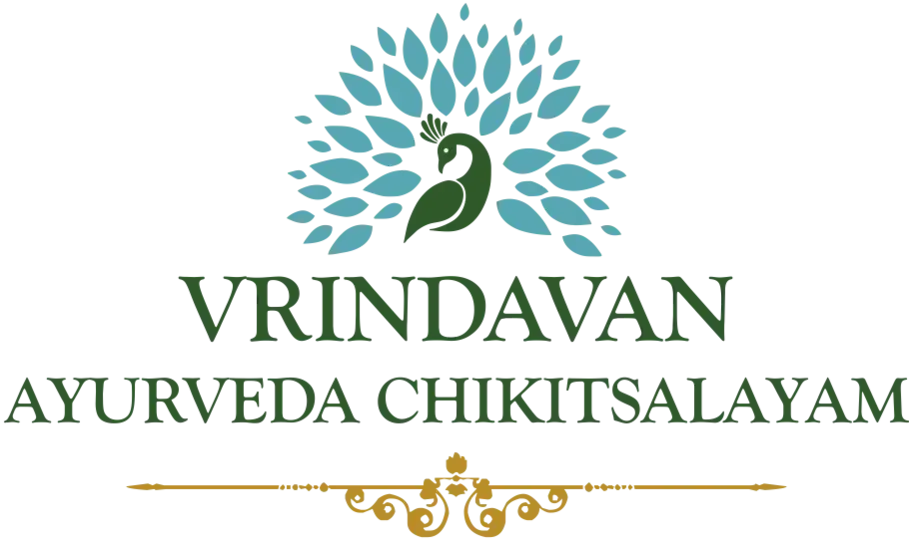In recent years, PCOS has become increasingly common in women of reproductive age. This is one of the most prevalent hormonal disorders and the leading cause of infertility in women.
Ayurveda offers a comprehensive method of management and treatment of PCOD by addressing the underlying imbalances in the body. And if you are also looking for the best ayurvedic treatment for PCOD, Vaidyaratnam Vrindavan Ayurveda Chikitsalayam is the place in Himachal Pradesh.
What is PCOD?
PCOD, also known as Polycystic Ovary Syndrome is a common hormonal disorder that affects women of reproductive age. Also, it is characterized by the presence of several small cysts on the ovaries. To be precise they are follicles that have not matured enough. In PCOD, a personal experiences imbalanced reproductive hormones that lead to multiple health problems.
Common Symptoms of PCOD
In some women, symptoms appear around the time of the first menstruation. Others don’t realize they have PCOS until they gain weight or become unable to conceive.
The most common PCOS symptoms are:
- Irregular Periods: If ovulation is missing, the uterine lining is not shed monthly. Also, some PCOS-suffering women experience no periods at all or fewer than eight periods annually.
- Infertility: PCOD is one of the leading causes of infertility due to irregular ovulation or lack of ovulation.
- Insulin Resistance: Many women with PCOS have insulin resistance, which can increase the risk of type 2 diabetes and obesity.
- Heavy Bleeding: The lining of the uterus forms over a long period of time, so your periods may be heavier than usual.
- Hair Growth: More than 70% of women with PCOS experience hair growth on the face and body. Further, excessive hair growth on a woman’s face, chest, and back is called hirsutism.
- Acne: Oily skin caused by male hormones can cause breakouts on the face, chest and upper back.
- Weight Gain: Eighty percent or more of women with PCOS are obese or overweight.
- Male Pattern Baldness: The hair on the scalp becomes thinner and may eventually fall out.
- Darkening of the Skin: Dark patches of skin may appear on body folds such as under the breasts, waist, and neck.
- Headaches: In some women, headaches occur due to hormonal changes.

Causes of PCOD
- Insulin Resistance: If cells develop resistance to insulin, blood sugar levels may increase. This may cause your body to produce more insulin, to lower blood sugar levels. If you have too much insulin in your system, your body may produce too much androgen. This hinders the process of ovulation.
- Hormonal Imbalance: Women with PCOD have high levels of androgens, such as testosterone. The increase in the male hormones prevents the ovaries from releasing eggs or regular menstrual cycles.
- Inflammation: Women suffering from PCOS may often experience increased inflammation in the body. Being overweight can also cause inflammation.
- Heredity: A family history of PCOS may contribute to the development of this condition.
- Environmental and Lifestyle Factors: Poor diet, lack of physical activity, stress, and obesity can contribute to the surfacing of PCOD.
Effective Ayurvedic Treatment of PCOD
According to Ayurvedic perspective PCOS can be correlated with Aarthava Kshaya. Aartava-kshaya is defined as a lack or deficiency of Artava, wherein Artava does not appear in time or is delayed, scanty, and does not persist for three days.
Aartava-kshaya is a disorder that occurs due to the vitiation of mainly Pitta and Kapha doshas. Further, the signs of kapha-dominant PCOS are coldness, hirsutism, increased weight, and subfertility.
- The symptoms of Pitta predominance PCOS include cardiac difficulties, painful menses, acne, and hair loss.
- Menstrual irregularities that are severe, scanty, and painful are a sign of Vata predominance. Additionally, Ayurvedic treatment for PCOD emphasizes identifying the root cause, managing the symptoms as well and addressing fertility, emotional, and related health issues. Let’s look out for more Ayurvedic treatments for PCOD.
- Balancing Doshas: Regulating Kapha, Vata, and Pitta dosha helps in the management of inflammation and controlling excessive androgen production or accumulation of toxins.
- Dietary Changes: In Ayurveda, emphasis on diet is very important. Women with PCOD must consume warm, light, and easily digestible foods. Also, avoiding heavy, oily, and cold foods to improve metabolism. Avoiding processed and junk foods help in controlling weight gain and support hormonal balance.
Ayurvedic Treatment for PCOD by Vaidyaratnam Vrindavan Ayurveda Chikitsalayam
VVAC is founded by Vaidyaratnam, Kerala, an eminent name in the Ayurvedic field. VVAC is situated amidst the foothills of the Shivalik range in Baddi. Himachal Pradesh. VVAC offers authentic Ayurvedic treatments & therapies to patients from all over India and abroad.
When a patient comes to VVAC for treatment, we place a strong emphasis on giving them a special and personalized treatment.
Ayurvedic doctor for PCOD near me at VVAC works on the root cause of the disease and provide a crystal-clear way to the medical condition of PCOD. Here, Panchakarma therapies work by improving the structural strength of the reproductive organs and balancing the endocrine and metabolic functions of the body.
Panchakarma Ayurvedic Treatment for PCOD at VVAC
- Virechana (Therapeutic Purgation): Virechana is biocleansing in nature and deeply detoxifies the body. It cleanses the toxins and metabolic waste accumulated in the body and balances the vitiated Dosha. Additionally, it helps in restoring the imbalanced hormone levels of the body. Virechana regulates liver metabolism, thus correcting the disturbed lipid levels in PCOS patients.
- Basti (Medicated Enema): One of the most effective Panchakrma therapies for balancing the Vata Dosha is Basti Chikitasa. Also, the primary factor in PCOD is Apanvayu, a type of Vata Dosha. In Basti Chikitasa medicine is administered in the form of Kwatha or decoction and medicated oil or ghee through the anus.
Basti aids in preserving healthy ovarian function, which is necessary for hormonal balance and regular menstruation cycles.
- Udvartana (Herbal Powder Massage): A dry massage helps reduce Kapha and promotes weight loss.
- Nasya (Nasal Medication): It clears the channels of the head and helps in the balancing of the hormones, especially related to the Pituitary gland.
Herbs for PCOD Ayurvedic Treatment
- Kumari (AloeVera): It has been found that Aloe Vera has antidiabetogenic, anti-inflammatory and antioxidant properties that help in controlling PCOS. Aloe vera is used along with some other compounds to help restore the levels of a hormone in the ovaries.
- Guduchi (Tinospora Cordifolia): It enhances immunity, reduces inflammation, and balances blood sugar levels.
- Triphala: A detoxifying herb that balances doshas and eliminates the toxins.
- Fenugreek (Methi): Consumption of Methi regulates menstrual cycles by reducing the levels of excess androgens, and supporting estrogen production.
- Cinnamon (Cinnamomum Zeylanicum): Around the world, people often use cinnamon as a spice. The health benefits of cinnamon are numerous and include anti-inflammatory, anti-lipidemic, hypoglycemic, and antioxidant properties. Also, Cinnamon is a multipurpose spice that has long been used by women suffering from PCOS to balance their hormone levels and improve their menstrual cycles.
- Ashwagandha (Withania Somnifera): Helps reduce stress, balance hormones, and improve insulin sensitivity. Also, it is called the Indian ginseng or winter cherry.
- Liquorice (Glycyrrhiza Glabra): One of the main causes of PCOS is high levels of male hormones, which are maintained by the powerful anti-adrenergic ingredient of licorice. Further, it reduces stress level, inflammation and insulin resistance.
- Shatavari (Asparagus Racemosus): It has been observed that ethanolic root extracts of Asparagus racemosus have the combined benefit of reducing hyperglycemia and hyperandrogenism, making them a viable therapeutic option for the treatment of PCOS.
Recommended Diet for PCOD
A well-balanced diet is important for managing Polycystic Ovarian Disease, as it can help in balancing hormones, and reducing the related symptoms with PCOD. Key principles of a PCOD diet are –
- Consume low GI (Glycemic Index) helps maintain stable blood sugar levels like whole grains, legumes, non-starchy vegetables, and fruits.
- Include sources of healthy fats like Avocados, nuts, seeds, and olive oil to balance hormones and reduce inflammation.
- Opt for lean protein sources like fish, legumes, chicken, and tofu to support muscle health and inhibits hunger pangs.
- Add herbal teas like green tea, ginger tea, cinnamon tea, or spearmint tea to reduce inflammation.
- Avoid refined carbohydrates like white bread, pasta, sugary cereals, pastries, and processed foods like packaged snacks, fast food or processed meats.
- Stay away from trans fats that are found in fried foods, margarine, and baked goods with hydrogenated oils.
Yoga for PCOD
Practicing yoga and pranayama are also a part of the Ayurvedic treatment for PCOD. Also, Meditation is a great practice to encourage relaxation. Some of the best yoga poses for PCOS are:

- Baddha Konasana (Bound Angle Pose) (Stimulates the abdominal organs, ovaries, and bladder)
- Supta Baddha Konasana (Opens the pelvic region, reduces stress, and balance hormones)
- Bhujangasana (Regulates menstrual flow, and stimulates the ovaries)
- Dhanurasana (Improves blood flow to the reproductive organs)
- Malasana (Opens the hips and groin)
- Setu Bandhasana (Stimulates the Thyroid gland)
- Balasana
- Surya Namaskar (Promotes weight loss and enhances blood circulation)
- Pranayama (Balances the doshas and hormones, reduces stress)
Lifestyle Modifications as a part of Ayurvedic Treatment for PCOD
I can understand your pain, exhaustion, and irritability when it comes you body suffering from PCOS but the symptoms can be kept under control. All it needs is to maintain a healthy lifestyle, which includes –
Wake Up Early – You must have heard, “early to bed, early to rise.” Waking up early, ideally before sunrise, helps reset your body’s natural rhythm. It boosts hormonal balance and improves digestion. This simple habit supports a calm mind and a more regular menstrual cycle.
Balanced Diet – Eating freshly cooked, light, and warm food keeps digestion strong. Avoiding oily, fried, and processed foods helps reduce toxins and hormonal imbalances. Including more fruits, vegetables, and whole grains nourishes the body deeply. Also, if your kitchen has white refined sugar, refined flour, and too much processed foods, then you need to throw them out. They are the biggest reasons to increase the insulin resistant levels in the body.
Regular Exercise – Daily movement like brisk walking, yoga, or light workouts improves blood circulation and helps manage weight. Regular physical activity reduces insulin resistance and supports healthy ovulation in PCOD.
Digital Detox Before Bed – Avoid using mobile phones or screens at least one hour before sleeping. Blue light affects your body’s sleep hormones and can disturb your cycle. Reading, light music, or deep breathing are better options before bed.
Stress Management – Chronic stress affects hormones. Taking time for relaxation, spending time in nature, journaling, or meditating daily can help bring emotional balance and support overall healing from PCOD.
FAQs on Ayurvedic Treatment for PCOD
- How effective is Ayurveda for PCOS?
Natural herbs like Ashwagandha, Shatavari and Turmeric are commonly used in Ayurveda to treat PCOD. Additionally, Yoga, diet and lifestyle changes along with Panchakarma therapy are helpful in overcoming PCOD.
- Which dosha causes PCOD?
Specifically, vitiation of the Kapha and Pitta doshas, as well as imbalance in Meda dhatu (body fat) and Rasa dhatu (plasma), are factors that lead to the development of PCOD.
- How to cure PCOD permanently?
Yes, PCOS can be managed by regular exercise, proper diet, using herbal formulations and Panchakarma treatments recommended by an expert Ayurvedic physician.
- What is the root cause of PCOD?
PCOD in women is mostly caused by hormonal imbalance which is induced by stress, a faulty diet and lifestyle. A balanced diet and weight loss can help regularize irregular menstruation and improve fertility.
- Can Panchakarma cure PCOS?
According to Ayurveda, there is a particular dosha imbalance in women suffering from PCOS. Panchakarma treatment helps in regulating this imbalance as well as detoxifying the body.







